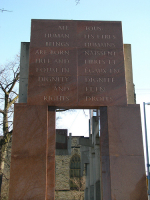2008: Celebrating the 60th Anniversary of the Universal Declaration of Human Rights
Universal Declaration of Human Rights: Introduction
Sixty years ago, nations of the world joined together in recognizing that all peoples, in all nations, are free and equal regardless of race, religion, economic status, age, gender or other personal characteristics. Through the signing of the Universal Declaration of Human Rights in 1948, the United Nations brought into being the first international document recognizing human rights as the foundation of peace, justice and freedom in the world.

The Universal Declaration outlines 30 basic rights essential for all human beings to achieve their full potential and to live a life free of fear and want. It was a unique approach that developed from the world saying 'never again' to the horrific events of World War Two, a war that brought a scale of atrocity never previously witnessed. The global death count is estimated to have been more than 50 million. War crimes were widespread: from the infamous Holocaust in which Nazi Germany sought to eliminate 'undesirables' such as Jews, Poles, Slavs, Roma, Sinti, the mentally and physically disabled, homosexuals and other persons, to the use of sex slaves, otherwise known as 'comfort women', by Japanese soldiers. Labour camps were used throughout the world and, disturbingly, World War Two brought the first testing of biological warfare by Japan and the use of atomic bombs in Nagasaki and Hiroshima by the United States of America. Read more...
Participation and Engagement in Society

The state is responsible for the protection of human rights for its citizens. Many countries around the world have approved domestic legislation to ensure citizens are granted these rights. In Canada, the Canadian Charter of Rights and Freedoms covers the political and civil rights of citizens. These rights form the basis for political participation in our country. This participation can take various forms - most commonly, the right to vote. It also includes the right to join political parties, to stand as a candidate in an election, to join an advocacy group and to demonstrate. These rights provide guidelines for citizens and government, protecting our individual welfare and preventing those in power from misusing their authority. The legal protection of our rights is absolutely necessary for the creation and maintenance of a society that is fair for all.
Rights come with responsibilities. It is the duty of each of us to ensure that our rights are protected by becoming involved in the decision-making process. One important way we can participate is by voting. But this right is not shared universally. Many countries limit or deny citizens the right to vote. In the past, Canada excluded citizens from voting on the basis of gender, race and religion. Women were only granted the right to vote in 1918, while Chinese, Indo- and Japanese Canadians were excluded from this right until the late 1940s. First Nations members were not given the right to vote until 1960, while patients in mental health facilities were unable to vote until 1988. Most recently in 2002, prisoners were given voting rights. This history of limiting voting rights has affected people ability to participate in politics, and consequently, their full inclusion in society.
When citizens are denied the right to vote, their ability to influence public policy is minimized. In some countries, people are subjected to violence, persecution and even death in their pursuit of political participation. As an alternative or complement to voting in Canada, many citizens express their opinions by participating in online communities, writing blogs, creating art to address a social or political cause, engaging in classroom discussions, joining protest movements, taking part in demonstrations and supporting religious and political groups. We are finding increasingly creative ways to engage. Online communities such as TakingITGlobal, apathyisboring, facebook and myspace provide new spaces for people to share opinions and organize. Consumer purchasing power has also become a form of speaking out--buying or boycotting products or services for political and ethical reasons takes on political significance and draws attention to issues.
Yet, many who have the civil right to engage politically choose not to. Voter apathy is rising in many western democracies and is particularly high amongst young voters. This lack of interest has negative consequences. When large segments of the population choose not to participate, the government is not held accountable by all citizens.
Sometimes we feel our rights and interests are neglected. The political process can be frustrating and intimidating. But it is our responsibility to be part of the decisions that affect our basic rights and freedoms. To contribute to the policy decisions that influence your country and community join a political party, lobby your elected officials or work with a group that supports a cause you care about. Active participation can be a great experience! So find ways to engage and to make your voice heard. It is not only your right, but your responsibility as a citizen.
Learn More! Get Involved!
- Apathy is Boring
- Association for Canadian Studies
- Canadian Political Science Association
- CIRCLE -- Centre for Information and Research on Civic Learning and Engagement
- Elections Canada
- Fair Vote Canada
Related International Human Rights Documents
- Freedom of Association and Protection of the Right to Organize Convention, 1948
- Right to Organize and Collective Bargaining Convention, 1949
- Convention on the Political Rights of Women, 1953
- International Covenant on Civil and Political Rights, 1966
- Optional Protocol to the International Covenant on Civil and Political Rights, 1966
- Second Optional Protocol to the International Covenant on Civil and Political Rights, 1990
- Declaration on the Right and Responsibility of Individuals, Groups and Organs of Society to Promote and Protect Universally Recognized Human Rights and Fundamental Freedoms, 1998
- United Nations Millennium Declaration, 2000



